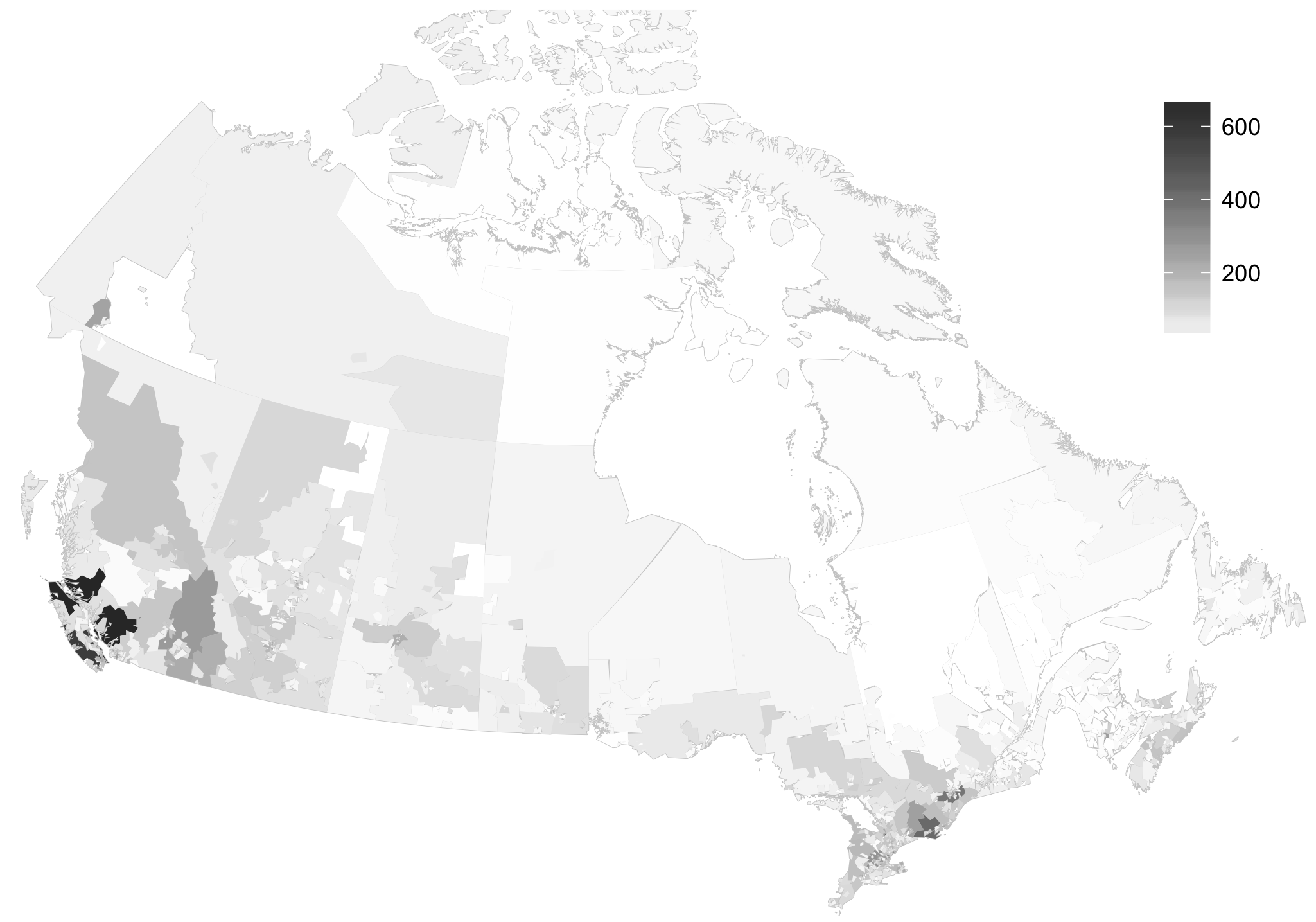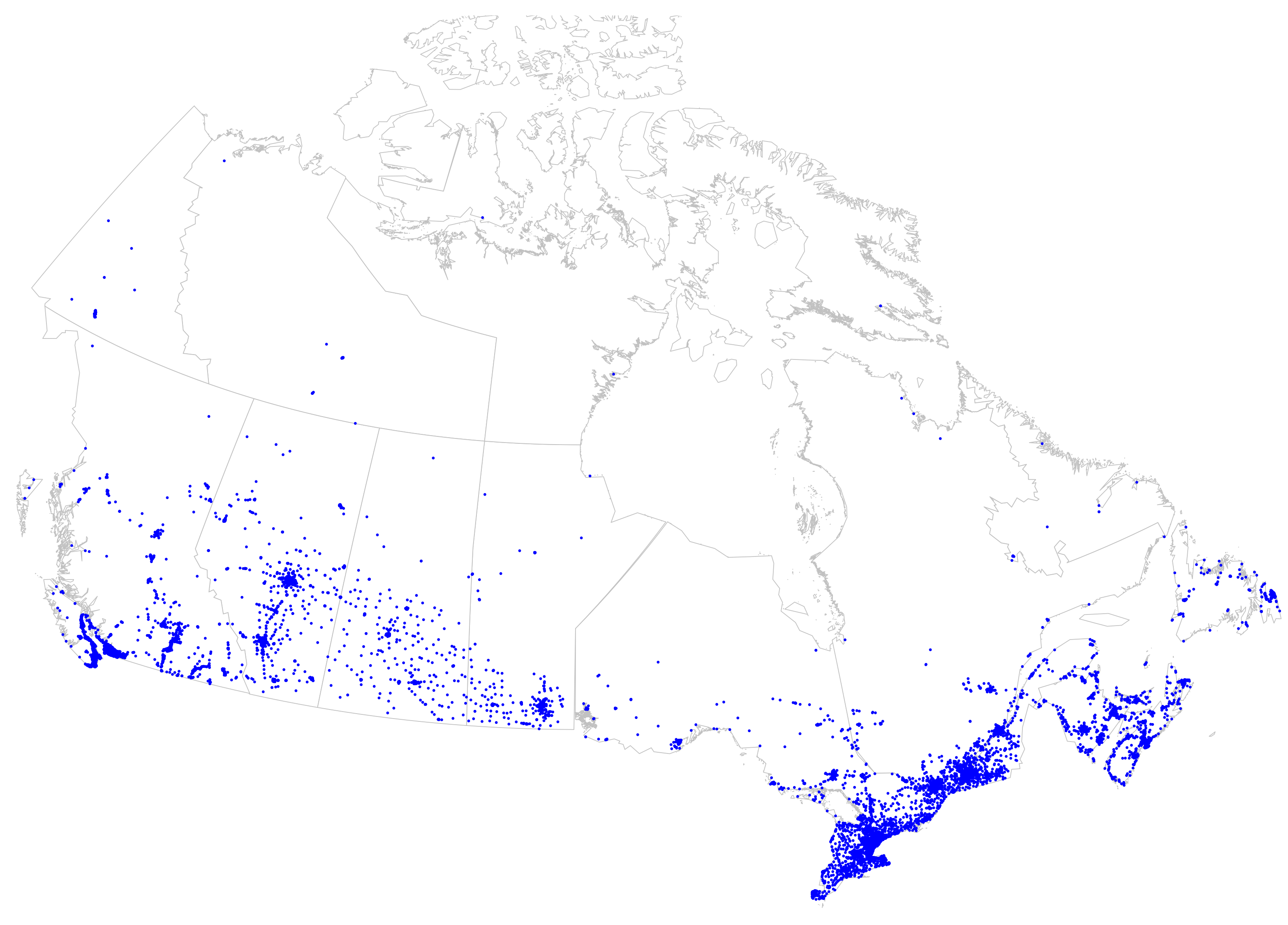Aug 01, 2018 tags: | exploratory analysis |
A battle for net neutrality in Canada — analysis of popular opposition to an application to disable on-line access to piracy sites
Background information
FairPlay Canada, a coalition of organizations involved in production and distribution of digital content in Canada has proposed to create an agency endowed with the right to disable access to internet resources deemed pirated. An application was filed with the Canadian Radio-television and Telecommunications Commission (CRTC) in January, 2018. The CRTC then started collecting public comments (“interventions”) via their website. To simplify submission of comments in opposition to the application, two campaigns were organized by the Canadian Internet Policy & Public Interest Clinic (via OpenMedia) and Leadnow. The comments collected in those campaigns were tabulated and submitted to the CRTC.
Data collection and privacy concerns
The comments (interventions) submitted to the CRTC were posted online for public access. Approximately 10,000 interventions from individuals and organization were collected over 3 months. In addition, CIPPIC and Leadnow submitted ~83,000+23,000 comments in opposition. Unfortunately, the CRTC made the interventions available as is, without anonymization. Personally identifiable information such as names, addresses, phone numbers, emails and job titles were exposed in comments submitted directly to the CRTC. The comments submitted via CIPPIC did not contain addresses or phone numbers, and only names and emails were exposed. The comments submitted via Leadnow contained only names. Since the interventions are still available online, I’ve decided against publishing the script for data collection. Instead I am providing a modified dataset in which names, positions and street addresses have been stripped, with phone numbers and email addresses reduced to the first three digits and email service providers respectively.
Protest dynamics
The interventions submitted directly to the CRTC are date-stamped which makes it possible to visualize the dynamics of the opposition campaign.

Geography
By province (~110,000 data points):
| ON | BC | AB | QC | MB | NS | SK | NB | NL | NA | PE | YT | NT+NU |
|---|---|---|---|---|---|---|---|---|---|---|---|---|
| 46.0% | 20.3% | 11.1% | 9.5% | 3.5% | 3.0% | 2.3% | 1.7% | 1.1% | 0.8% | 0.4% | 0.3% | 0.1% |
By first letter of postal code (~110,000 data points): Map legend
| V | L | M | T | K | N | H | R | J | B | S | P | E | G | A | C | Y | X |
| 19.6% | 13.6% | 11.7% | 10.5% | 8.5% | 8.3% | 4.7% | 3.2% | 3.1% | 2.8% | 2.2% | 2.0% | 1.6% | 1.3% | 1.1% | 0.4% | 0.2% | 0.1% |
Top 10 cities (from ~10,000 data points):
| City | Prov | n |
|---|---|---|
| Toronto | ON | 1133 |
| Ottawa | ON | 647 |
| Calgary | AB | 516 |
| Edmonton | AB | 430 |
| Montreal | QC | 400 |
| Winnipeg | MB | 371 |
| Vancouver | BC | 360 |
| Victoria | BC | 242 |
| Mississauga | ON | 181 |
| London | ON | 144 |
By forward sortation area (~110,000 data points):

Polygon file from Statistics Canada provided under the terms of Statistics Canada Open License Agreement
Approximate sources of comments (identified by postal code):

Crowdsourced Canadian Postal Code Polygon File from Geolytica Inc provided under the terms of the Creative Commons Attribution 2.5 Canada License
Popular comments (from ~10,000 data points)
The ~10,000 interventions submitted directly to the CRTC were not restricted to any specific set of comments. The majority of the comments left were improvised. Only about 1,500 comments are encountered more than once. Below is the table of the most popular ones:
| Comment (first 100 characters) | n |
|---|---|
| Dear Commissioners, I am gravely concerned about the recent proposal from the so-called “FairPl | 373 |
| “Piracy” sites are commonly also large sharing sites that exchange legal software and media. This is | 187 |
| I am concerned about the erosion of information access and the precedent this sets to allowing ISPs | 126 |
| <empty comment section> | 110 |
| I am in opposition to Bell Media’s application to prevent access to piracy sites. The approval of ap | 84 |
| The applicants in this proceeding cite many studies from the Australian and American contexts, regar | 62 |
| I am gravely concerned about the recent proposal from the so-called “FairPlay Canada” coalition to i | 44 |
| Blocking websites for piracy is a slippery slope to further websites being blocked for less relevant | 42 |
| I am in opposition to this. This is a disproportionate, unconstitutional proposal sorely lacking in | 36 |
| “Piracy” sites are commonly also large sharing sites that legally exchange open software and media. | 31 |
| Giving ISPs the power to block websites and censor the internet is a very bad idea that doesn’t serv | 25 |
| Looking at other countries, the excuse for site blocking starts with something like, “piracy” and th | 22 |
| I am against this plan to block sites as I feel it would be against the principle of net neutrality | 16 |
| No. Censorship is wrong, especially when it’s to protect someone’s business model. “As the Americans | 16 |
| Dear CRTC Commissioners, I am strongly opposed to the recent proposal by the deceptively named | 15 |
| net neutrality is essential for democracy and must be protected from corporate interests who wish to | 15 |
The top comment was taken from Open Media’s website. The wide range of dates corresponding to interventions with this comment makes it difficult to determine how this comment was shared. The dates of submissions with the second and third most popular comments suggest the comments were shared through reddit on 2018-01-31 and on 2018-02-28.
Comment language (~10,000 data points)
Submissions containing é, l’ and la in the comment field were flagged as francophone. All other non-empty comments were labeled as English.
results$Lang <- ''
results$Lang[!is.na(results$com_short) & results$Source=='CRTC'] <- "EN"
results$Lang[grepl("(é)|([ ]l\')|([ ]la[ ])", results$Comment)] <- "FR"
Languages by province:
| AB | BC | MB | NB | NL | NS | NT | NU | ON | PE | QC | SK | YT | |
|---|---|---|---|---|---|---|---|---|---|---|---|---|---|
| EN | 1313 | 1510 | 507 | 182 | 119 | 327 | 12 | 2 | 4558 | 37 | 788 | 236 | 12 |
| FR | 12 | 9 | 6 | 1 | 0 | 2 | 0 | 0 | 36 | 0 | 164 | 4 | 0 |
The large number of English comments from Québec looks surprising. One reason for that is the focus of the opposition campaigns on English-speaking media. Another reason (judging by the large number of English comments from persons with typical québécois names and French writing patterns) is the lack of confidence in the ability of federal agencies to communicate in French. The infamous “Turquie épicé du sein wrap blanc” from Sobeys, although unrelated to our Federal Government, is a good illustration of what fuels the linguistic distrust. Other reasons have been discussed in /r/Québec
Let’s take a look at the top 5 cities for each language.
English:
| City | n |
|---|---|
| Montréal | 351 |
| Gatineau | 57 |
| Québec | 60 |
| Laval | 33 |
| Brossard | 14 |
French:
| City | n |
|---|---|
| Montréal | 47 |
| Québec | 27 |
| Laval | 11 |
| Gatineau | 9 |
| Chicoutimi | 4 |
Unrelated stuff: top 10 email service providers (93,000 data points)
| gmail.com | 52% |
| hotmail.com | 17% |
| yahoo.ca | 3% |
| yahoo.com | 2% |
| shaw.ca | 2% |
| outlook.com | 2% |
| live.ca | 2% |
| rogers.com | 1% |
| telus.net | 1% |
| live.com | 1% |